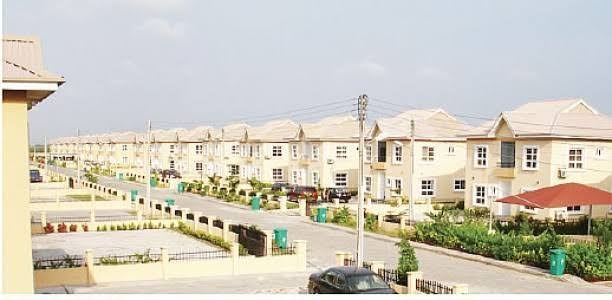The Nigerian state says it will pursue LAND VALUE CAPTURE through property tax as a way to raise money from land dealings for infrastructural development and to solve the housing deficit.
The state says it will pursue LAND VALUE CAPTURE vigorously by charging owners of completed, unoccupied houses triple ground rents. Ground Rent in Nigerian is a property tax charged and collected by a government on land with a Certificate of Occupancy or Right of Ownership, payable by a property owner within a given period.
Mr. Ahmed Dangiwa the country’s Minister of Housing and Urban Development, made this known while inspecting National Housing Programme in Abuja.
The state says it cannot continue to watch developers have completely unoccupied properties littered all over the Federal Capital Territory (FCT) while many of the residents, especially the poor need accommodation.
The government through the Minister, assured that part of the things to do is to take the accurate data of all completed unoccupied houses. And after collecting the data, it will compel the owners to pay triple ground rents.
The state argues that when that happens, owners of the completed unoccupied houses will be forced to rent them out to those needing accommodation. And, that will make accommodation affordable in Abuja and also address the housing deficit which has continued to be a major challenge in FCT-Abuja and other major cities in Nigeria.
Showing its determination to pursue LAND VALUE CAPTURE through property tax, the Minister disclosed that it has directed the Department of Lands, Urban, and Regional Planning to take accurate counts of all housing estates in the FCT-Abuja. According to him, that will make owners of completed unoccupied houses known to the government and the public for effective collection of triple ground rent.
The Minister assured that any housing estate that has been completed and has remained unoccupied for more than three months will be forced to pay triple ground rents.
Good as this sounds, this is not the first time the Nigerian state has assured the people of her desire to impose a property tax on unoccupied buildings as a way of pursuing the LAND VALUE CAPTURE policy.
Last year the Senate Chambers of Nigeria’s National Assembly, disclosed its readiness to introduce a law that would impose heavy tax on unoccupied houses in FCT-Abuja.
Mr. Smart Adeyemi, the then Chairman of Senate Committee on the Federal Capital Territory, who spoke on the planned legislation during an interactive session with journalists, frowned at the huge number of unoccupied houses in FCT. He argued that imposing property tax on them is a solution to addressing it and will also enable the state to key into LAND VALUE CAPTURE that will allow for revenues to provide community infrastructure.
Adeyemi argued, that when that happens, the owners of the properties will be forced to rent them, leading to affordable housing in the city and also addressing the housing deficit.
The United Nations (UN), having realized the importance of addressing the housing problem in FCT-Abuja through LAND VALUE CAPTURE, on September 24, 2019, advised the FCT administration to impose a vacant house tax to tackle the extreme housing deficit.
Leilana Fartha, the UN Special Rapporteur on the Rights to Adequate Housing, who advised the Nigerian state on imposing property tax on unoccupied houses, pointed out that about 69% of FCT-Abuja residents live in informal settlements. And, of concern is that they lack infrastructure such as water, light, roads, and hospitals.
Although the Nigerian state had made pronouncements on its determination to key into LAND VALUE CAPTURE through property tax, they have continued to be policy pronouncements that are yet to translate into tangible actions and impact.
It is our hope that the latest pronouncement by Mr. Ahmed Dangiwa the country’s Minister of Housing and Urban Development, on the government’s determination to impose property tax on unoccupied houses as a means of LAND VALUE CAPTURE policy will make a difference and not end up like others.
In FCT-Abuja, estate developers and land speculators have continued to deny the poor from benefitting in lands that are free gifts from God. They have since made access and benefits to land a business that shuts the poor out by making them victims of God’s free gifts rather than beneficiaries.
When the state embraces LAND VALUE CAPTURE and imposes a property tax on unoccupied buildings that are littered all over the city of FCT-Abuja, it will raise revenues to fund public infrastructure. That will also make access to decent housing affordable to many low-income earners. And, this will address the housing deficit that has continued to be a major problem in Abuja and major cities in Nigeria.
Audu Liberty Oseni, MAWA Foundation Coordinator


As Administrator for the International Union for Land Value Taxation and a United Nations NGO representative I hereby most favorably acknowledge the intention of Nigerian authorities to implement this increase of land taxes on unoccupied land and housing in Abuja. This is indeed the correct way to harness public finance policy in order to have the highly valuable urban land put to good use for housing, business and industry rather than treated as a commodity for land speculation. Bravo and may you rapidly move forward to policy implementation!!!